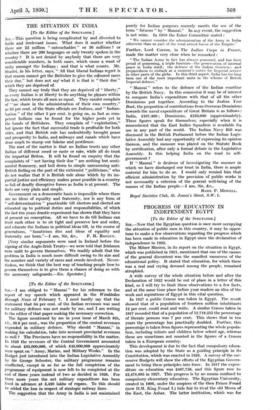THE SITUATION IN INDIA
[To the Editor of the SPECTATOR.] _
Sin,—This question is being complicated by and .diverted to futile and irrelevant issues. What does it matter whether there are 23 million. " untouchables " or 50 millions ? or whether there are 200 languages or only twenty spoken in the country ? It is not denied by anybody that there are very considerable numbers, in both cases, which cause a want of unity amongst the Indians ; and that is what counts. Mr. Shastri, in his letter, says,'" All that liberal Indians regret is that reason cannot get the Britisher to give the cAtoured races their due," Ink does not say what it is that is "'their due " which they are deprived of.
They cannot say truly that they are deprived of " liberty," as every Indian is at liberty to do anything he pleases within the law, which treats all men as equal. They camlot complain of " no share in the administration of their own country," as 95 per cent. of the State officials are Indians, and " Indian- isation " of the other 5 per cent. is going on, as fast as com- petent Indians can be found for the higher posts yet in the hands of Britishers. They complain of " exploitation," but ignore the fact that successful trade is profitable for both sides, and that British rule has undoubtedly brought peace and prosperity to India, and railways and canals which have done much to stamp out fainine and pestilence.
The root of the matter is that no Indian trusts any other Indian of different creed or caste or nil*, while all do trust the impartial Briton. It will be found. on enquiry that the complaints of " not having their due " are nothing but senti- mental flummery, and boil down to simple unreasoning anti- British feeling on the part of the extremist " politicians," who do not realize that it is British rule alone which by its im- partial justice and efficiency makes peace possible in a country so full of deadly disruptive forces as India is at present. The facts are very plain and simple.
Government on a democratic basis is impossible where there are no ideas of equality and fraternity, nor is any form of " self-determination " practicable till electors and elected are educated up to political duties and responsibilities, of which the last ten years drastic experiment has shown that they have at present no conception. All we have to do till Indians can trust each other is to sit tight and preserve law and order, and educate the Indians in political ideas till, in the course of generations, "fanaticism dies and ideas of eqUality and
fraternity are born."—I am, Sir, &c., F. R. BAGLEY.
[Very similar arguments were used in Ireland before the signing of the Anglo-Irish Treaty—we were told that Irishmen were unfit to govern themselves. We readily admit that the problem in India is much more difficult owing to its size and the number and variety of races and creeds involved. Never- theless, we think that the best way of teaching people how to govern themselves is to give them a chance of doing so with the necessary safeguards.—En. Spectator.]










































 Previous page
Previous page